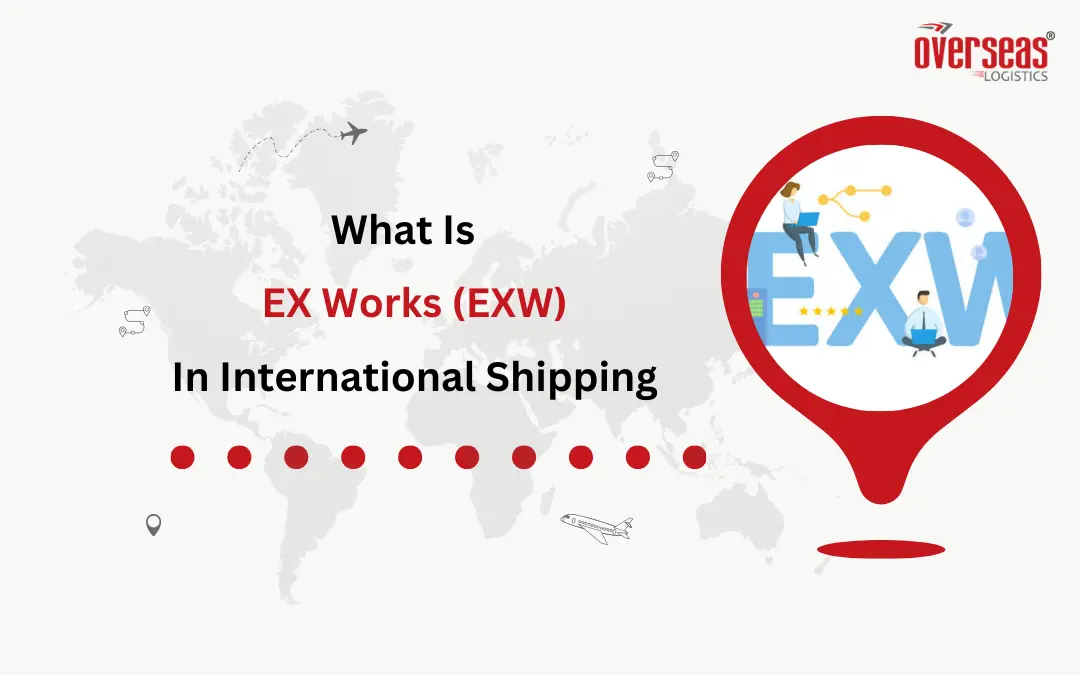Unlock the insights into EX Works Incoterms (EXW) with our comprehensive guide. Delve into the meaning, rules, pricing dynamics, and real-world examples of this fundamental international trade rule. Explore how EXW reshapes responsibilities between sellers and buyers, offering opportunities and efficiencies for eCommerce businesses in the B2B sector.
Understanding EXW Incoterm in Shipping
Defining EXW in International Shipping
EXW is a set of shipping terms crucial in international courier, where the seller’s obligations conclude at their premises, and the buyer assumes responsibility. This incoterm, particularly impactful in eCommerce, redraws the lines of liability, offering a clear boundary between parties.
Real-World Example
Imagine a Berlin-based eCommerce startup exporting handcrafted home decor items to Toronto under an EXW agreement. The seller’s responsibility ends as the goods are made available at their warehouse. The Canadian buyer, knowledgeable about local shipping and regulations, takes charge of the entire shipping process. This strategic use of EXW enables the Berlin startup to focus on crafting unique items while simplifying international logistics.
Seller’s Responsibilities under EXW
- Packaging: Ensuring secure packaging aligns with international standards is crucial to preventing damage during transit. The choice of materials and methods should suit the nature of the goods, especially for fragile items.
- Delivery: Goods must be prepared and positioned at the seller’s premises for the buyer to collect. Clearly defining the location is vital, influencing the buyer’s logistics planning and affecting transportation costs.
Buyer’s Responsibilities under EXW
- Loading Charges: The buyer shoulders the responsibility of loading goods onto their transport vehicle after the seller makes them available.
- Delivery to Port/Place: Arranging transportation from the seller’s location to the export port becomes the buyer’s task, involving complex decisions on cost, speed, reliability, and route challenges.
- Export Duty, Taxes, and Customs Clearance: Managing and paying export-related duties, and taxes, and fulfilling customs clearance requirements rest on the buyer. Accurate preparation of necessary documents is crucial to avoid delays or legal complications.
- Loading on Carriage: For the main carriage to the destination port, the buyer arranges loading onto the chosen transport mode.
- Carriage Charges: The buyer negotiates and pays all freight transportation charges from origin to destination, considering factors like cost, reliability, and transit times.
- Delivery to Destination: Responsibility for the final leg of the journey, from the destination port to the buyer’s facility, falls on the buyer, requiring strategic planning for potential hurdles.
- Unloading at the Destination: Upon arrival, the buyer unloads the goods, ensuring careful handling to prevent damage. Advance arrangements for resources like labor and unloading equipment are essential.
- Import Duty, Taxes, and Customs Clearance: Handling and paying all import duties and taxes in the destination country is the buyer’s responsibility, requiring adherence to local laws and regulations.
Advantages of EXW
- Negotiable Logistics: Buyers can choose logistics providers, potentially reducing shipping costs.
- Quality Oversight: Direct control over handling and transportation ensures goods meet quality standards.
- Consolidated Shipments: Businesses can optimize logistics and reduce costs by consolidating shipments.
- Informed Decision-Making: Access to detailed shipping information enables better inventory and operational planning.
- Simplified Seller Role: EXW simplifies the seller’s role, allowing them to focus on production and local logistics.
Disadvantages of EXW
- Logistical Challenges: Managing the entire transportation process can be daunting, especially for those new to international shipping.
- Shipping Insurance Costs: Buyers bear the cost of shipping insurance from the point of collection.
- Variable Shipping Costs: Costs may vary based on market conditions, impacting budgeting and costing.
Conclusion
EXW can be a potent tool for eCommerce businesses, but success relies on understanding its implications and adopting a strategic approach. Businesses lacking international trade expertise can leverage Overseas Logistics for comprehensive cross-border trade solutions, benefiting both sellers and buyers with streamlined logistics.
Explore Overseas Logistics’s solutions, offering warehouses for sellers and international courier recommendations, shipping rate calculators, hassle-free custom clearance, and freight forwarding for buyers. With end-to-end shipment tracking and a dedicated key account manager service, Overseas Logistics provides accessibility at zero setup and subscription fees.
FAQs
What is the difference between EXW and FOB?
EXW requires the buyer to pay for goods when delivered to a specified location by the seller, taking responsibility for transportation and logistics. FOB means the seller places goods on board the shipping vessel at the port of departure, transferring responsibility to the buyer once loaded.
How to calculate the EX Works price?
Calculate the EX Works (EXW) price by adding the product and packaging costs, including profit share and associated fees. Add costs for each leg of the journey to determine the total EXW price.
What is the ex-factory price FOB?
The ex-factory price is the cost of the product at the factory, excluding transportation or associated costs. The FOB price is calculated as FOB Value = Ex-Factory Price + Other Costs.
What is the difference between ex-work and ex-factory?
EX-factory refers to prices at the factory gate, with freight and transit insurance costs borne by the buyer. Ex Works (EXW) is a shipping arrangement where the seller makes the product available at a specific location, with the buyer paying transport costs.
What is EXW and CIF?
CIF involves the seller covering the cost of goods, freight, and insurance until arrival at the destination port. EXW (Ex Works) sees the seller making goods available at their premises, with the buyer taking over responsibility for transportation and logistics.

